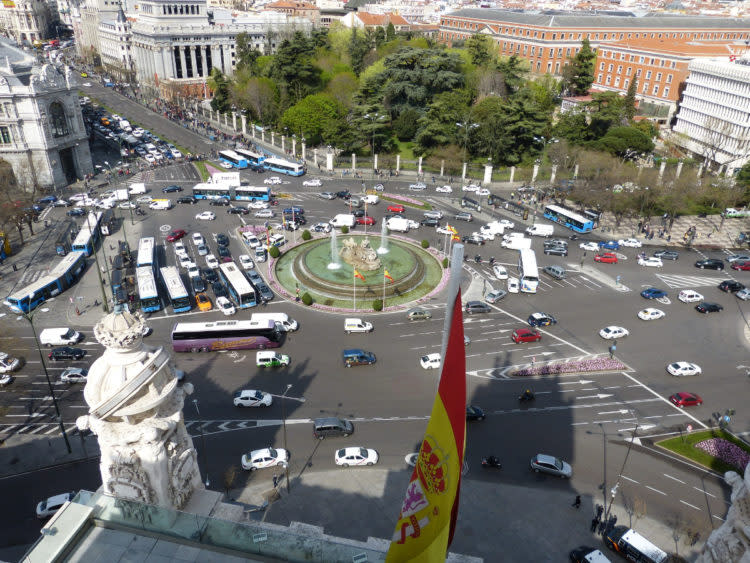12 Countries That Produce the Most Cars
In this article we are going to list the 12 countries that produce the most cars. Click to skip ahead and jump to the 5 countries that produce the most cars.
When the first car was produced 134 years ago in 1886, few would have thought the invention would have the level of impact we see today. But now, no matter what country you live in, big or small, developed or developing, rich or poor, step outside and you'll see a billion cars passing by.
Okay fine, maybe I exaggerate a little but it is true that cars are absolutely dominating our lives now. If you live in any major city in your country, you will be lucky to find space to walk. And the situation is even worse in developing countries, where there are little rules and regulations regarding cars and how they operate. Look, I'm the first person to say that cars have made our lives so much easier. Before, it would take me over an hour to go to office, where first I'd have to walk a couple of kilometers to the bus stop, get on the bus which would have a long, meandering route which would take twice the time it should normally take and then walk a couple more kilometers from the bus stop to my office. Getting a car changed all of that entirely. Now it takes me between 15 - 2o minutes to reach my office, saving me around an hour and a half every single day. I can now use that extra hour and a half to right more articles for you to read!
The importance of having cars is much more significant in developing economies as opposed to developed economies. Why is that, you may ask? Well, in most developing countries, and especially in my country, infrastructure is far from what norms and quality dictate it should be. Poverty, corruption and incompetence ensure that things don't develop as they should, and our public transport infrastructure has been virtually non-existent for decades. When I mentioned getting to the bus stop earlier, it wasn't a literal bus stop where the bus is designated to stop for a bit; it's just a road on the route of the bus where you stand and raise your hand to signal the bus to stop and then jump in, even as it starts moving. The process is the same for getting off which is why there's always an element of danger in taking the bus too. You also cannot count on the public transport being on time; sometimes the gap between buses is 2 minutes and on other occasions, it could be 20, depending on what time you look for them. We even used to have our own circular railway as the city I live in is among the biggest cities in the world, but the funny thing is, that railway was operational decades ago and has since fallen into disrepair. Hence, buying a car becomes a necessity rather than a luxury. And this is despite imported cars resulting in a lot of duty, which is why a $20,000 car in the US might cost more than $40,000 in my city, reducing most people to buying second hand cars or those of lower quality.

Pixabay/Public Domain
In the developed world on the other hand, and this is something I am always in awe of when I visit any of these cities, public transport is excellent. There are multiple public transport options which are regulated and aren't even that costly, including buses, trams, subways and taxis among other options. Not only are these options state of the art, but are extremely punctual as well and you can use them without fear of being late. In fact, I seem to remember reading an article some time ago where a Japanese subway departed 25 seconds early, and apologized profusely for this mistake. This is the importance that the governments give to public transport and has allowed people to not need to own cars, and only own them if they want. Which is why many people I know who live in these countries haven't even considered owning a car, since they seem to not have any need to. Another understated fact is that these countries also have much more moderate weather which is conducive to cycling, walking and running, while in my city, the temperature is over 100 degrees Fahrenheit around 7-8 months each year, along with high levels of humidity discouraging these activities during the day time. Plus, there isn't proper space for pedestrians to walk in most areas and the concept of cycle lanes is yet to exist or be successfully executed by the government.
Another important reason why developed economies, especially in Western Europe, do not have as many cars even though they have a lot of the major manufacturers? Climate change. Cars have been running on diesel and petrol for over a century now, and even though we've known for decades the damage that this is doing to the environment, until some time ago, there weren't enough viable alternatives to substitute these cars. Cars and trucks emit carbon dioxide, and when you consider the total number of cars in the world, you can be certain that their cumulative emissions are devastating to the planet. This is why many Western countries are aiming to get rid of diesel or petrol cars completely in the next few decades, and making their major cities car free. This is also why many major cities in Europe such as Oslo have or are aiming to make their city centers car free as well, encouraging people and tourists to walk at a leisurely pace and take everything in without having to worry being run over by a car. In the United States, a fifth of all greenhouse gas emissions are through cars and trucks.
This is where electric cars come in. Electric cars have electric motors which use the energy stored in rechargeable batteries (see 11 best lithium and battery stocks to buy). They have tons of benefits over conventional combustion engine cars including the facts they they are quieter, more efficient (meaning they provide a lot more mileage) and have no exhaust emissions, thereby reducing their total emissions as compared to combustion engine cars. They also require lower maintenance costs and fueling costs due to their efficiency. While initially, they were more expense than ICE cars, at least in the US in 2020, electric vehicles have become cheaper due to the aforementioned reasons. Many countries have also started to provide incentives, tax breaks, subsidies and other forms of motivation and encouragement to move to electric vehicles. California, one of the biggest car markets in the world, has introduced an executive order which aims to phase out the production of gasoline powered cars by 2035.
Even though electric vehicles are gaining in popularity, there is still a lot more work to be done, where in 2020, only 1 out of every 200 cars produced globally was electric. Elon Musk saw the market and the impending dynamic change several years ago when he established Tesla (NASDAQ:TSLA), which had a few rocky years, but has produced the best selling electric car ever in the Tesla Model 3, while Toyota (NYSE:TM) produced the most popular hybrid with its Toyota Prius model. The main challenge behind electric vehicles gaining popularity globally is that most developing countries don't have the necessary infrastructure such as charging stations needed to make the switch not just possible, but probable as well. However, the way Tesla seems to be going, it seems the world is very much on board for this change which is why the company's valuation is greater than the next 5 biggest car producers combined and made Elon Musk the richest person in the world briefly, while he is now comfortably second. Many of the other biggest producers of car such as Ford (NYSE:F), General Motors (NYSE:GM), Honda (NYSE:HMC) and Volkswagen have all engaged in producing electric cars as well. We should also mention Chinese EV stocks such as NIO Limited (NIO) and Li Auto Inc. (LI) which don't crank out a lot of vehicles right now, but their market values imply that they are likely to capture a large chunk of the Chinese EV market in the future.
The total number of cars produced in 2019 was 91.7 million, with the peak coming in 2017, when 97.3 million cars were produced. In just the last decade, 890 million vehicles have been produced with is nothing less than incredible. These numbers include all sorts of vehicles from ultra rare and ultra luxury vehicles worth millions of dollars to cheap versions which are only good for transporting you from Point A to Point B. Just the 12 countries that produce the most cars were responsible for around 82% of the total production and unsurprisingly, include the biggest countries in the world, especially in terms of population since that leads to higher demand. So without further ado, let's take a look at the countries with the highest car production, with rankings based on their production in 2019 and 2018, and all statistics taken from the Organisation Internationale des Constructeurs d'Automobiles, starting with number 12:
12. Canada
Car production in the country in 2019: 1,916,585
Car production in the country in 2018: 2,020,840
We start off with Canada, which is the only country in our list to produce less than 2 million units in 2019.

11. Thailand
Car production in the country in 2019: 2,013,710
Car production in the country in 2018: 2,167,694
A surprise entry on our list of the countries that produce the most cars is Thailand, which is more known for tourism but also has a thriving automotive industry, which is bigger than many major countries such as the UK, Italy and Belgium.

10. France
Car production in the country in 2019: 2,202,460
Car production in the country in 2018: 2,270,000
France ranks 10th in our list of the countries that produce the most cars. France is the first European country in our list, and is home to two major automakers in Renault and Stellantis.

9. Spain
Car production in the country in 2019: 2,822,355
Car production in the country in 2018: 2,819,565
Spain is one of the few European countries in our list of the countries that produce the most cars, with 2.8 million units produced in both 2018 and 2019.

8. Brazil
Car production in the country in 2019: 2,944,988
Car production in the country in 2018: 2,879,809
Brazil is one of the most populous countries in the word, and has a high demand for cars which is why there are almost 3 million cars produced in the country annually.

Rio de Janeiro, Brazil
7. South Korea
Car production in the country in 2019: 3,950,617
Car production in the country in 2018: 4,028,834
South Korea ranks 7th in our list of the countries that produce the most cars. South Korea is one of the most developed countries in Asia and its car industry is quite strong as well, with perhaps the biggest car company there being KIA.

6. Mexico
Car production in the country in 2019: 3,986,784
Car production in the country in 2018: 4,100,770
Mexico is one of the biggest car markets in the world, and most of the major car manufacturing companies have assembly plants there as well.
Please continue to see the 5 countries that produce the most cars. Suggested articles:
Disclosure: No Positions. 12 Countries That Produce The Most Cars is originally published at Insider Monkey.
